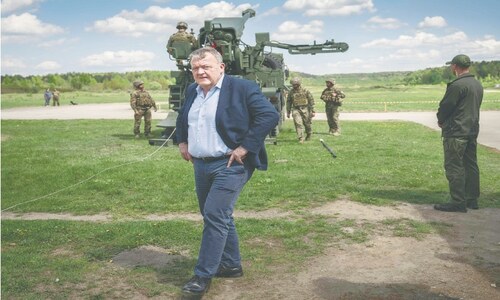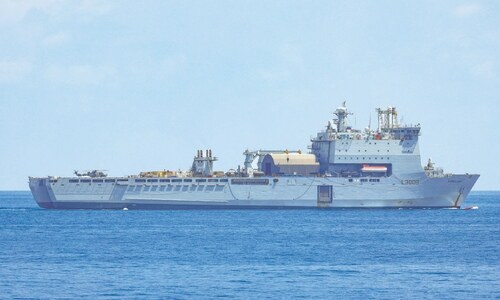**VILNIUS (Lithuania): Britain has blocked the first crucial talks on intelligence and espionage between European officials and their American counterparts since the NSA surveillance scandal erupted.* * The talks, due to begin in Washington on Monday, will now be restricted to issues of data privacy and the NSA’s Prism programme following a tense 24 hours of negotiations in Brussels between national EU ambassadors. Britain, supported only by Sweden, vetoed plans to launch two “working groups” on the espionage debacle with the Americans.
Instead, the talks will consist of one working group focused on the NSA’s Prism programme, which has been capturing and storing vast amounts of internet and mobile phone metadata in Europe.
The disclosures over the past month have triggered a transatlantic crisis of confidence and threatened to derail crucial free trade talks between the EU and the US, also due to be launched in Washington on Monday.
The talks on Prism and data privacy have been arranged to coincide with the trade talks in an attempt to defuse the transatlantic tension. EU diplomats and officials say the offer of talks by the Americans is designed to enable the leaders of Germany and France to save face following revelations about the scale of US espionage — particularly in Germany, but also of French and other European embassies and missions in the US.
Other aspects of the dispute, such as more traditional spying and intelligence matters, will be off limits for the Europeans after Britain insisted the EU had no authority to discuss issues of national security and intelligence.
“It was decided. It finished successfully,” said Dalia Grybauskaite, the president of Lithuania, which has just assumed the EU’s six-month rotating presidency and which mediated the sensitive talks in Brussels over the past two days.
On Thursday, Grybauskaite said the Europeans hoped to hold two separate strands of consultations with the Americans. By Friday she and Jose Manuel Barroso, the European commission president, conceded that the intelligence strand had been dropped. “Intelligence matters and those of national security are not the competence of the EU,” he said, echoing the UK’s objection.
Senior EU diplomats, officials, and government ministers confirmed that Britain opposed most of the rest of the EU on joint European talks with the Americans on intelligence and espionage, meaning that national governments will need to pursue the issues separately with Washington.
“The consultations in Washington will first of all address data protection matters. Addressing the intelligence topic is not expected,” said a senior Lithuanian official.
The Lithuanian government phoned Carl Bildt, Sweden’s foreign minister, on Thursday evening to try to remove the Swedish resistance, but failed, sources said. The talks in Brussels continued throughout the night as diplomats sought to come up with wording that would keep everyone happy.
Officials said the abortive attempt to come up with a common European position only served to highlight the divisions that have surfaced as a result of the espionage scandal, with the Europeans against the Americans, the French and the Germans against the British, and leading pro-EU figures arguing that the fiasco has underlined the case for Europe constructing its own cyber-defences.
“We need our own capacities, European cloud computing, EU strategic independence,” said Michel Barnier, the French politician and European commissioner for the single market.
Such is the transatlantic and intra-European disarray over the espionage wars, that senior east and west European politicians and intelligence veterans privately suspect a Russian role in the intelligence row. They point to the presence of the NSA whistleblower, Edward Snowden — apparently still at Moscow’s Sheremetyevo airport — and to the controversy surrounding the Bolivian presidential plane. President Evo Morales, travelling from Moscow, was forced to land in Vienna after being denied permission to enter the airspace of several EU countries.
The surveillance dispute led to calls, particularly from France, for the long-awaited negotiations on a transatlantic free trade pact to be delayed. The simultaneous opening of talks on the NSA, Prism and surveillance is designed to mute such calls and give European leaders an opportunity to climb down while claiming concessions from the Americans, EU diplomats said.
By arrangement with the Guardian
















































Dear visitor, the comments section is undergoing an overhaul and will return soon.